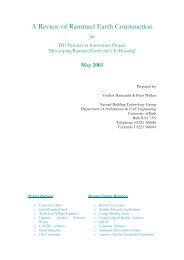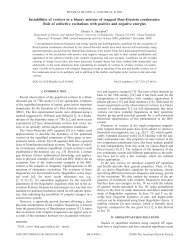- Page 1 and 2:
Contents 1 Introduction 13 1.1 Hist
- Page 3 and 4:
CONTENTS 3 4 Modular Methods 113 4.
- Page 5 and 6:
CONTENTS 5 A Algebraic Background 2
- Page 7 and 8:
List of Figures 2.1 A polynomial SL
- Page 9 and 10:
LIST OF FIGURES 9 List of Open Prob
- Page 11 and 12:
Preface This text is under active d
- Page 13 and 14:
Chapter 1 Introduction Computer alg
- Page 15 and 16:
1.1. HISTORY AND SYSTEMS 15 1.1 His
- Page 17 and 18:
1.2. EXPANSION AND SIMPLIFICATION 1
- Page 19 and 20:
1.2. EXPANSION AND SIMPLIFICATION 1
- Page 21 and 22:
1.2. EXPANSION AND SIMPLIFICATION 2
- Page 23 and 24:
1.3. ALGEBRAIC DEFINITIONS 23 which
- Page 25 and 26:
1.3. ALGEBRAIC DEFINITIONS 25 Propo
- Page 27 and 28:
1.5. SOME MAPLE 27 Definition 18 (F
- Page 29 and 30:
Chapter 2 Polynomials Polynomials a
- Page 31 and 32:
2.1. WHAT ARE POLYNOMIALS? 31 2.1.1
- Page 33 and 34:
2.1. WHAT ARE POLYNOMIALS? 33 MULTI
- Page 35 and 36:
2.1. WHAT ARE POLYNOMIALS? 35 not n
- Page 37 and 38:
2.1. WHAT ARE POLYNOMIALS? 37 While
- Page 39 and 40:
2.1. WHAT ARE POLYNOMIALS? 39 p:=x+
- Page 41 and 42:
2.2. RATIONAL FUNCTIONS 41 Proposit
- Page 43 and 44:
2.3. GREATEST COMMON DIVISORS 43 2.
- Page 45 and 46:
2.3. GREATEST COMMON DIVISORS 45 Le
- Page 47 and 48:
2.3. GREATEST COMMON DIVISORS 47 93
- Page 49 and 50:
2.3. GREATEST COMMON DIVISORS 49 a
- Page 51 and 52:
2.3. GREATEST COMMON DIVISORS 51 #
- Page 53 and 54:
2.4. NON-COMMUTATIVE POLYNOMIALS 53
- Page 55 and 56:
Chapter 3 Polynomial Equations In t
- Page 57 and 58:
3.1. EQUATIONS IN ONE VARIABLE 57 S
- Page 59 and 60:
3.1. EQUATIONS IN ONE VARIABLE 59 I
- Page 61 and 62:
3.1. EQUATIONS IN ONE VARIABLE 61 T
- Page 63 and 64:
3.1. EQUATIONS IN ONE VARIABLE 63 S
- Page 65 and 66:
3.2. LINEAR EQUATIONS IN SEVERAL VA
- Page 67 and 68:
3.2. LINEAR EQUATIONS IN SEVERAL VA
- Page 69 and 70:
3.2. LINEAR EQUATIONS IN SEVERAL VA
- Page 71 and 72:
3.3. NONLINEAR MULTIVARIATE EQUATIO
- Page 73 and 74:
3.3. NONLINEAR MULTIVARIATE EQUATIO
- Page 75 and 76:
3.3. NONLINEAR MULTIVARIATE EQUATIO
- Page 77 and 78:
3.3. NONLINEAR MULTIVARIATE EQUATIO
- Page 79 and 80:
3.3. NONLINEAR MULTIVARIATE EQUATIO
- Page 81 and 82:
3.3. NONLINEAR MULTIVARIATE EQUATIO
- Page 83 and 84:
3.3. NONLINEAR MULTIVARIATE EQUATIO
- Page 85 and 86:
3.3. NONLINEAR MULTIVARIATE EQUATIO
- Page 87 and 88:
3.3. NONLINEAR MULTIVARIATE EQUATIO
- Page 89 and 90:
3.3. NONLINEAR MULTIVARIATE EQUATIO
- Page 91 and 92:
3.3. NONLINEAR MULTIVARIATE EQUATIO
- Page 93 and 94:
3.3. NONLINEAR MULTIVARIATE EQUATIO
- Page 95 and 96:
3.4. NONLINEAR MULTIVARIATE EQUATIO
- Page 97 and 98:
3.4. NONLINEAR MULTIVARIATE EQUATIO
- Page 99 and 100:
3.4. NONLINEAR MULTIVARIATE EQUATIO
- Page 101 and 102:
3.5. EQUATIONS AND INEQUALITIES 101
- Page 103 and 104:
3.5. EQUATIONS AND INEQUALITIES 103
- Page 105 and 106:
3.5. EQUATIONS AND INEQUALITIES 105
- Page 107 and 108:
3.5. EQUATIONS AND INEQUALITIES 107
- Page 109 and 110:
3.5. EQUATIONS AND INEQUALITIES 109
- Page 111 and 112:
3.6. CONCLUSIONS 111 Partial Proof.
- Page 113 and 114:
Chapter 4 Modular Methods In chapte
- Page 115 and 116:
4.1. GCD IN ONE VARIABLE 115 The co
- Page 117 and 118:
4.1. GCD IN ONE VARIABLE 117 This l
- Page 119 and 120:
4.1. GCD IN ONE VARIABLE 119 be mad
- Page 121 and 122:
4.1. GCD IN ONE VARIABLE 121 Figure
- Page 123 and 124:
4.1. GCD IN ONE VARIABLE 123 Figure
- Page 125 and 126: 4.2. POLYNOMIALS IN TWO VARIABLES 1
- Page 127 and 128: 4.2. POLYNOMIALS IN TWO VARIABLES 1
- Page 129 and 130: 4.2. POLYNOMIALS IN TWO VARIABLES 1
- Page 131 and 132: 4.3. POLYNOMIALS IN SEVERAL VARIABL
- Page 133 and 134: 4.3. POLYNOMIALS IN SEVERAL VARIABL
- Page 135 and 136: 4.3. POLYNOMIALS IN SEVERAL VARIABL
- Page 137 and 138: 4.3. POLYNOMIALS IN SEVERAL VARIABL
- Page 139 and 140: 4.4. FURTHER APPLICATIONS 139 2 7 3
- Page 141 and 142: 4.4. FURTHER APPLICATIONS 141 i.e.
- Page 143 and 144: 4.5. GRÖBNER BASES 143 Observation
- Page 145 and 146: 4.5. GRÖBNER BASES 145 Table 4.2:
- Page 147 and 148: 4.5. GRÖBNER BASES 147 Figure 4.17
- Page 149 and 150: Chapter 5 p-adic Methods In this ch
- Page 151 and 152: 5.2. MODULAR METHODS 151 nomials, b
- Page 153 and 154: 5.4. FROM Z P TO Z? 153 Figure 5.3:
- Page 155 and 156: 5.5. HENSEL LIFTING 155 polynomials
- Page 157 and 158: 5.5. HENSEL LIFTING 157 Figure 5.4:
- Page 159 and 160: 5.5. HENSEL LIFTING 159 Figure 5.7:
- Page 161 and 162: 5.7. UNIVARIATE FACTORING SOLVED 16
- Page 163 and 164: 5.8. MULTIVARIATE FACTORING 163 Ope
- Page 165 and 166: Chapter 6 Algebraic Numbers and fun
- Page 167 and 168: 6.1. THE D5 APPROACH TO ALGEBRAIC N
- Page 169 and 170: Chapter 7 Calculus Throughout this
- Page 171 and 172: 7.2. INTEGRATION OF RATIONAL EXPRES
- Page 173 and 174: 7.2. INTEGRATION OF RATIONAL EXPRES
- Page 175: 7.2. INTEGRATION OF RATIONAL EXPRES
- Page 179 and 180: 7.3. THEORY: LIOUVILLE’S THEOREM
- Page 181 and 182: 7.3. THEORY: LIOUVILLE’S THEOREM
- Page 183 and 184: 7.4. INTEGRATION OF LOGARITHMIC EXP
- Page 185 and 186: 7.5. INTEGRATION OF EXPONENTIAL EXP
- Page 187 and 188: 7.5. INTEGRATION OF EXPONENTIAL EXP
- Page 189 and 190: 7.5. INTEGRATION OF EXPONENTIAL EXP
- Page 191 and 192: 7.7. THE RISCH DIFFERENTIAL EQUATIO
- Page 193 and 194: 7.8. THE PARALLEL APPROACH 193 i.e.
- Page 195 and 196: 7.10. OTHER CALCULUS PROBLEMS 195 7
- Page 197 and 198: Chapter 8 Algebra versus Analysis W
- Page 199 and 200: 8.2. BRANCH CUTS 199 8.2 Branch Cut
- Page 201 and 202: 8.2. BRANCH CUTS 201 Note that the
- Page 203 and 204: 8.5. INTEGRATING ‘REAL’ FUNCTIO
- Page 205 and 206: Appendix A Algebraic Background A.1
- Page 207 and 208: A.1. THE RESULTANT 207 Proposition
- Page 209 and 210: A.2. USEFUL ESTIMATES 209 Corollary
- Page 211 and 212: A.2. USEFUL ESTIMATES 211 Propositi
- Page 213 and 214: A.2. USEFUL ESTIMATES 213 centring
- Page 215 and 216: A.3. CHINESE REMAINDER THEOREM 215
- Page 217 and 218: A.5. VANDERMONDE SYSTEMS 217 Clearl
- Page 219 and 220: A.5. VANDERMONDE SYSTEMS 219 wherea
- Page 221 and 222: Appendix B Excursus This appendix i
- Page 223 and 224: B.2. EQUALITY OF FACTORED POLYNOMIA
- Page 225 and 226: B.3. KARATSUBA’S METHOD 225 addit
- Page 227 and 228:
B.4. STRASSEN’S METHOD 227 answer
- Page 229 and 230:
B.4. STRASSEN’S METHOD 229 If the
- Page 231 and 232:
Appendix C Systems This appendix di
- Page 233 and 234:
C.2. MACSYMA 233 (1) -> a:=1 Figure
- Page 235 and 236:
C.3. MAPLE 235 > (x^2-1)^10/(x+1)^1
- Page 237 and 238:
C.3. MAPLE 237 Table C.2: Another s
- Page 239 and 240:
C.5. REDUCE 239 1: (x^2-1)^10/(x+1)
- Page 241 and 242:
Appendix D Index of Notation Notati
- Page 243 and 244:
Bibliography [Abb02] J.A. Abbott. S
- Page 245 and 246:
BIBLIOGRAPHY 245 [BCM94] [BCR98] [B
- Page 247 and 248:
BIBLIOGRAPHY 247 [Buc79] [Buc84] [B
- Page 249 and 250:
BIBLIOGRAPHY 249 [CW90] D. Coppersm
- Page 251 and 252:
BIBLIOGRAPHY 251 [FGT01] E. Fortuna
- Page 253 and 254:
BIBLIOGRAPHY 253 [Isa85] I.M. Isaac
- Page 255 and 256:
BIBLIOGRAPHY 255 [Loo82] R. Loos. G
- Page 257 and 258:
BIBLIOGRAPHY 257 [Per09] [PQR09] [P
- Page 259 and 260:
BIBLIOGRAPHY 259 [SS11] J. Schicho
- Page 261 and 262:
BIBLIOGRAPHY 261 [Zip79b] R.E. Zipp
- Page 263 and 264:
INDEX 263 Budan-Fourier theorem, 63
- Page 265 and 266:
INDEX 265 Polynomial, 186 Least com
- Page 267 and 268:
INDEX 267 Toeplitz Matrix, 65 Trage



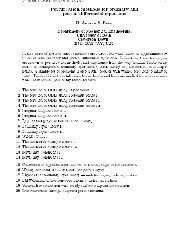
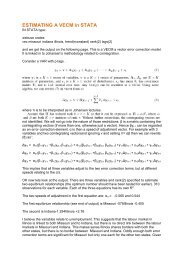


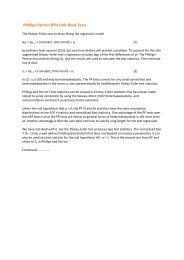
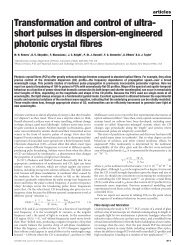


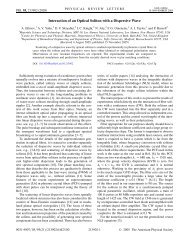
![[Luyben] Process Mod.. - Student subdomain for University of Bath](https://img.yumpu.com/26471077/1/171x260/luyben-process-mod-student-subdomain-for-university-of-bath.jpg?quality=85)


